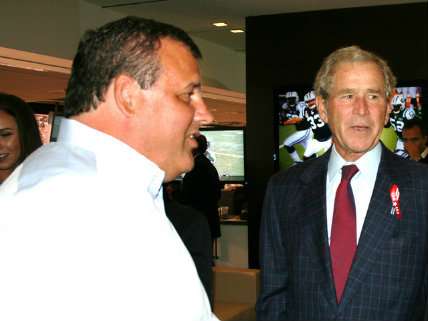Chris Christie is the GOP Establishment Candidate. Does that Make Him the 2016 Frontrunner Too?

New Jersey Governor Chris Christie is fast becoming the 2016 presidential candidate of the GOP's establishment. If it wasn't clear already, a story in this weekend's New York Times makes it impossible to miss.
Jonathan Martin's story looks at the ways that Christie is modeling his presumed upcoming (and, to be sure, still unofficial) presidential campaign on George W. Bush's first presidential run. Much of the piece is devoted to highlighting the connections between Christie's budding operation and GOP campaigns past.
For example, the New Jersey governor has hired microtargeting experts who worked for the George W. Bush and Mitt Romney campaigns, hoping to build on their technological expertise to appeal to groups that the GOP has recently underperformed with. He's using former Romney adviser Russ Schriefer to put together his campaign ads. He's got Spencer Zwick, who is close with the Romney family, working as his chief fundraiser, and is continuing to rely on strategy leadership from Mike DuHaime, the architect of Christie's 2009 campaign for governor and someone who has been described as having "close ties to Romneyland." Christie is meeting with or reaching out to deep-pocketed GOP donors across the country, including casino-magnate and Romney megadonor Sheldon Adelson. He's having pizza with Weekly Standard editor Bill Kristol. Bush White House lieutenant Karl Rove is providing the Times with strategy-centric quotes like, "He's going to emphasize first trying to win a big re-election with a diverse coalition behind him."
This makes Christie the establishment candidate—and, arguably, the party's early frontrunner for the 2016 nomination. Why do they like him so much? Mainly, they emphasize, because they want to win. As National Review's Robert Costa notes in a piece on Christie's establishment darling cred, party bigwigs are keenly interested in the governor's "electability."
Obviously, Christie isn't a surefire hit with every red-state voter. As the Times notes, there's a fair amount of skepticism about Christie within the GOP base, especially given his election-eve praise of the president following Hurricane Sandy.
But there was plenty of base skepticism about the last two GOP nominees, Mitt Romney and John McCain, as well. Both were early establishment favorites, and both won their primary contests on the strength of persistent establishment support. And both garnered support for their supposed "electability."
This is the way the GOP nomination process typically works: a gang of the party's elites pick a candidate early on, then throw a lot of support his way. The candidate has to fend off a series of challengers preferred by various elements of the base. But since base support is split, the establishment candidate takes home the trophy.
So is Christie already set to win? Maybe not. With so long to go until the next campaign, it's obviously a mistake to presume anything. And it's not clear that party's familiar patterns will hold. Yes, the establishment is picking its man early, and making it known, as usual. But the party's establishment is having a harder time getting what it wants these days than in the past. Comprehensive immigration reform, a top priority for the party's consultant and business class, is stalled in the House. The party's upstart spending hawks seem to have a small edge on its old-guard defense hawks. There are a lot of ways in which the party's establishment seems to be losing its grip.
The question, then, is who could successfully challenge Christie. Sen. Ted Cruz (R-Texas) is one possibility, but he's already being sidetracked by pre-silly season nonsense involving Canadian citizenship. Another option is Sen. Rand Paul (R-Ky.). Christie is already setting himself up as the anti-Paul, singling out the Kentucky senator's critical views on surveillance and national security. The governor has directly attacked the strand of politics that Paul represents as well. "This strain of libertarianism that's going through both parties right now," Christie said in July, "I think is a very dangerous thought."
That might appeal to a hawkish party establishment. But Americans of both parties increasingly seem to think that the kind of security-state maximalism that Christie represents is what's dangerous.
More than half say that there's not enough oversight of the snooping programs, while just 18 percent say it's well-supervised. If anything, Republicans are actually more worried about privacy violations than their Democratic counterparts; 77 percent of Republicans say that the NSA's mass-surveillance sweeps intrude on privacy rights, compared to 70 percent of Democrats. It's a libertarian moment in America.
Maybe you can see why Christie is so worried about the GOP's libertarian streak. If it persists, it could be quite dangerous—to his candidacy.


Show Comments (176)